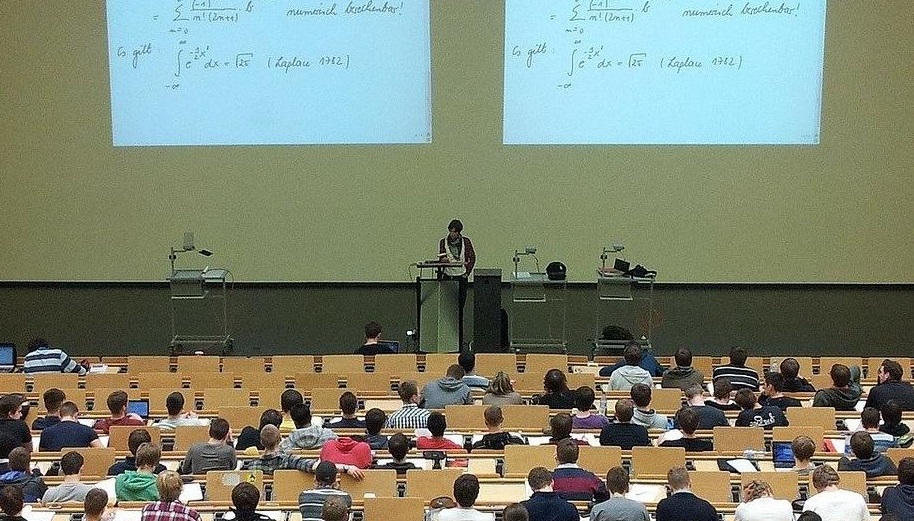.
Logic Class
As class convenes I quickly indicate in clear
logician’s diction of my eagerness to share
my disposition to determine if we’re here
or there, or if instead we’re neither here nor there.
A student with a lisp, who would have been dismissed
by any academic dean or exorcist,
got up and shook his fist, proposing to assist
by posing logic twists too cryptic to resist:
“If you were here or there then if you weren’t here
you would be there, although if everybody isn’t there
you’d certainly be here; but if you aren’t here
and aren’t there you can’t be here or there—it’s clear
you can’t be anywhere—but if you aren’t there
or aren’t here you could of course be anywhere,
for then you could be here, which isn’t there, or there,
which isn’t here, unless that’s neither here nor there.”
And somewhere in the list of dictums missed amidst
this syllogistic mist there did indeed exist
a philosophic gist that no one could enlist
since common sense insisted class should be dismissed.
.
.
A Love Remembered
A melody secreted from the past
is lingering inside me: neural fires
rekindle, frolic, titillate, and cast
your fleeting image on my eyes. Desires
awaken, musings fill my memory:
your voice and violins, a blossoming
of lovers, lilacs, and the mystery
of woodlands come to life, the early spring
ablush in verdancy; your perfumed skin
arousing passion in my soul, your smile
an artist’s masterpiece as doves begin
to serenade, to flatter and beguile
in waves of soothing choruses, sublime
attendants to my moments back in time.
.
.
Paul Buchheit, a lifelong Chicagoan and retired college teacher, is an author of books, poems, progressive essays, and scientific journal articles. He recently completed his first historical novel, 1871: Rivers on Fire. His most recent non-fiction book was Disposable Americans, published in 2017 by Routledge.















These are wonderful poems Mr. Buchheit! Brings back so many nostalgic memories of my school days.
What I was particularly captivated about was the rhythmic rhyming scheme of the first poem. To me it almost resembles a tongue twister especially in the following lines:
A student with a lisp, who would have been dismissed
by any academic dean or exorcist,
got up and shook his fist, proposing to assist
by posing logic twists too cryptic to resist
And again in the last lines:
And somewhere in the list of dictums missed amidst
this syllogistic mist there did indeed exist
a philosophic gist that no one could enlist
since common sense insisted class should be dismissed.
………………………………………………
………………………………………………
I also admire the wholesome feeling of the second poem, which if I am correct, is a sonnet. I like the way you portrayed a past love through music. In an aesthetic way, it captures a sense of innocence and sentimentality that enhances the overall charm of the poem.
In summary, I truly enjoyed reading these poems of yours Mr. Buchheit!
Thank you, Ryan. I appreciate your kind words!
‘ablush in verdancy’ is officially one of my all time favourite phrases.
Thanks for two great reads, Paul.
Thanks, Paul
Not much to say about the first poem, except it is great! I love the wordplay.
Thanks, David.
Mr. Buchheit,
Your 1st is hyst-erical. It reminds me of the Monty Python song “Eric the half a bee ” (‘o ‘ad han haccident): “.. to half be mute philosophically half not be …”
The gentle enjambment in your 2nd suggests that familiar, besotted, head-in-the-clouds feeling. Good going!
Sorry; corr.: “… to half be must philosophically …”, etc.
Thank you, Julian!
“Logic Class” reminds me of why I gave up teaching logic. Even with a workbook and answer key, I hardly understood the subject myself, and could not make its intricacies clear to students. Therefore, I will simply ask you to explain some logic from “A Love Remembered.” This beautiful poem seems to make a little jump in line 12. The doves begin to serenade, but do they also flatter and beguile? Or is “your smile” doing that? Thanks for the poem and the help!
Thanks, Margaret. It’s all about the doves at the end there.
Logic Is Logic. That’s All I Say – Oliver Wendell Holmes
Paul, your highly amusing, tongue-twisting, brain-straining ‘Logic Class’ is huge fun to read aloud. ‘A Love Remembered’ is a smooth and soothing serenade that submerges the senses in bliss. Lovely!
Thank you, Susan!